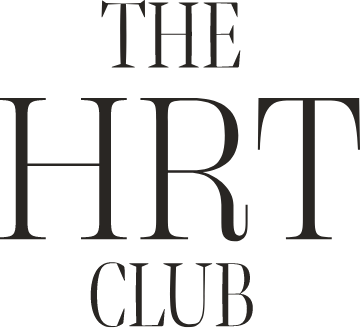Written by Georg F. Armstrong
The biggest barrier to HRT access? Doctors don’t have the time—or the training—to talk menopause.
Too many women enter menopause feeling confused, unsupported, and unaware of their options. That’s why The HRT Club had a conversation with leading menopause expert Dr. Mary Claire Haver, MD, FACOG, CMP, to discuss the most pressing issues around menopause, from symptom management to hormone therapy and healthcare accessibility. In this candid conversation, Dr. Haver breaks down the myths, science, and systemic gaps surrounding menopause and hormone therapy—and what we can do to change the narrative.
Interview with Dr. Mary Claire Haver
Q: What are the most common symptoms women face during menopause?
Dr. Haver: Hot flashes, night sweats, anxiety, mood changes, irritability, joint pains, brain fog, decreased libido, weight gain and many, many more.
In The New Menopause, Dr. Haver emphasizes that these symptoms are not just inconveniences but significant disruptions to daily life. She notes:
“Every woman deserves to know the truth about what the lack of estrogen does to your body. It’s detrimental to our health when we lose it.”
This underscores the importance of recognizing and addressing menopausal symptoms proactively.
Q: How does menopause affect a woman’s physical and mental health in the long term?
Dr. Haver: The lack of estrogen in menopause can lead to osteoporosis, anxiety, decreased cognition, decreased ability to cope with or complete routine tasks, cause heart palpitations, weight gain, recurrent UTI’s and painful intercourse.
Dr. Haver elaborates in her book that the decline in estrogen during menopause has far-reaching effects on various aspects of health, including cardiovascular and cognitive functions. She states:
“Gaining an understanding of the changes happening in the body during perimenopause and menopause…will help protect you and potentially prolong your life.”
This highlights the necessity for women to be informed about these changes to take proactive steps in managing their health.
Q: Are there any specific risk factors that could lead to early onset menopause or more severe symptoms?
Dr. Haver: Women who have had their ovaries removed (surgical menopause) or experience Premature Ovarian Insufficiency. Premature Ovarian Insufficiency occurs when the ovaries stop functioning properly before age 40, failing to produce regular eggs and normal levels of estrogen, which often leads to irregular periods, infertility, and menopausal symptoms.
In The New Menopause, Dr. Haver discusses that factors such as genetics, autoimmune diseases, and certain medical treatments can contribute to earlier onset of menopause or exacerbate symptoms. She emphasizes the importance of personalized care in these situations.
Q: What is Hormone Replacement Therapy, and how does it work in managing menopause symptoms?
Dr. Haver: It restores a woman’s level of estradiol and progesterone to not only help relieve menopausal symptoms but to prevent negative effects of inflammation in the body.
Dr. Haver further explains in her book that Hormone Replacement Therapy (HRT) can have preventive impacts beyond symptom relief. She notes;
“Hormone replacement therapy can have a preventative impact in these conditions.”
This includes reducing the risk of osteoporosis and cardiovascular disease, highlighting the broader benefits of HRT.
Q: What are the potential benefits of HRT for women going through menopause?
Dr. Haver: Prevention of osteoporosis, brain, and cardiovascular health as estrogen provides cardiovascular and neuroprotection against aging and disease.
In The New Menopause, Dr. Haver underscores that HRT not only alleviates menopausal symptoms but also plays a crucial role in long-term health maintenance. She discusses how estrogen therapy can help in maintaining bone density and reducing the risk of heart disease.
Q: Are there any risks associated with HRT, and how can women make informed decisions about its use?
Dr. Haver: If women have estrogen or progesterone receptor positive breast cancer or a recent blood clot or pulmonary embolism, we have to screen them closely and determine if the benefits outweigh the risks.
Dr. Haver advises in her book that while HRT is beneficial for many, it’s essential to evaluate individual health profiles. She encourages women to have informed discussions with their healthcare providers to weigh the benefits and risks appropriately.
Q: How does a woman’s health history impact how they are prescribed HRT?
Dr. Haver: If a woman still has her uterus, she must also be prescribed a progestogen to prevent a buildup of the uterine lining and possible abnormal cell growth.
In her book, Dr. Haver details the various HRT options, including estrogen-only and combined therapies, and emphasizes the importance of tailoring treatment plans to individual needs and medical histories.
Q: In your experience, what are the most common misconceptions or fears women have about HRT?
Dr. Haver: Women are still fearful that they will get breast cancer, blood clots or strokes from MHT. Dr. Haver addresses these concerns in The New Menopause, clarifying that many fears stem from outdated studies and misinformation. She advocates for updated education and open conversations between women and their healthcare providers to dispel myths and provide accurate information.
Q: What are some things impacting accessibility to hormone therapy for interested patients?
Dr. Haver: The main factor impacting accessibility to Menopause Hormone Therapy (MHT) seems to be physicians and mid-level providers do not have the time to talk to their patients about MHT and others simply do not believe that women need it, or should have it, due to the Women’s Health Initiative (WHI) study outcome, which we now know as misrepresented data.
In her book, Dr. Haver emphasizes the need for systemic changes in healthcare to improve access to menopause care. She encourages women to advocate for themselves and seek out providers who are knowledgeable and supportive of menopause management options.
Looking for a new provider? Click here.
Q: How can we increase menopause awareness and foster open communication on the topic?
Dr. Haver: Social media has helped considerably. Women must keep talking about it and advocating for change. I co-authored A Citizen’s Guide to Menopause Advocacy guide, with Menopause Advocate Jennifer Weiss-Wolf. This guide features advice from women leading the charge to improve menopause experience for all.
Dr. Haver also introduces the “Pause Life Menopause Toolkit” in her book, which includes six essential components: nutrition, stress reduction, exercise, sleep, community, and pharmacology. She emphasizes that a holistic approach is vital for managing menopause effectively and encourages women to utilize these tools to take control of their health.

Dr. Mary Claire Haver, MD, FACOG, CMP, is a board-certified Obstetrics and Gynecology specialist, a Certified Menopause Practitioner from The Menopause Society (formerly the North American Menopause Society (NAMS)), a Certified Culinary Medicine Specialist, and a passionate entrepreneur and best-selling author with a focus on women’s health. Dr. Haver graduated from Louisiana State University Medical Center and completed her Obstetrics and Gynecology residency at the University of Texas Medical Branch (UTMB).


